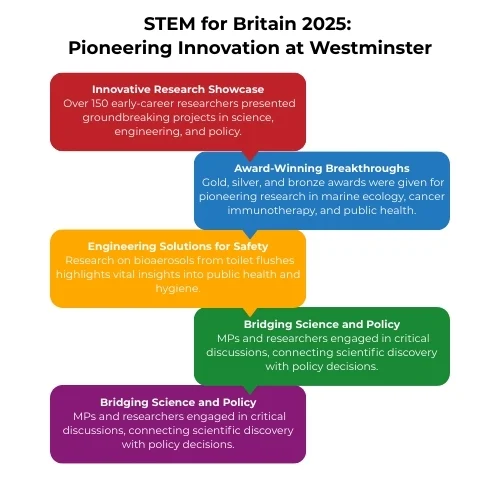STEM for Britain 2025: Early-Career Researchers Light Up Westminster with Innovation
STEM for Britain 2025: Early-Career Researchers Light Up Westminster with Innovation
- Home
- STEM For Britain
- Posters in Parliament
STEM for Britain 2025
Recent Post

Introduction
LONDON, March 11, 2025 — The historic halls of the UK Parliament were buzzing with excitement as STEM for Britain 2025 brought together over 150 of the country’s most promising early-career researchers. The Parliamentary & Scientific Committee hosted STEM for Britain, as it does annually, and has done since its inception in 1997, to provide unique access for young researchers to present their research to policymakers and to help close the often-significant gap between science and legislation.
The show took place in the Houses of the Parliament and featured five research science disciplines — Biological and Biomedical Sciences, Chemistry, Engineering, Mathematical Sciences, and Physics — where participants showcased their research in a high-profile poster competition. Members of Parliament and Lords, along with influential people from the scientific community, engaged with researchers and provided insight into the next generation of STEM-based innovation in the UK.


A Parliament Full of Posters and Purpose
From cancer diagnostics and clean energy to AI-assisted medicine and marine life, the range of research shown demonstrated the importance of young scientists in addressing global challenges Despite the average age of presenters being just 27, their work spoke volumes about the maturity and relevance of the UK’s academic pipeline.
Walking the corridors alongside curious MPs were representatives from academia, industry, and science policy bodies. Chi Onwurah MP (Labour) and Greg Clark MP (Conservative), both advocates of science and innovation, praised the event’s importance in connecting cutting-edge research to national decision-making.
“This is such an important event to remind us that the future of science – and indeed the future of the planet – rests with these bright and young minds!” said Onwurah.

Spotlight on Award-Winning Research

Biological and Biomedical Sciences
- Gold Award: Anneliese Hodge, a PhD researcher at Plymouth Marine Laboratory and University of Plymouth, stunned judges with her research on the ecotoxicological effects of UV filters from sunscreens on marine microalgae. Her findings revealed alarming consequences for ocean ecosystems.
Interesting Fact
One drop of sunscreen can contaminate 10,000 litres of seawater and potentially stop photosynthesis by microalgae, which makes over half of the world’s oxygen.
“Microalgae are the lungs of the ocean. If we damage them, we damage ourselves,” Hodge told attendees.
- Silver Award: Magdalena Armas of the Francis Crick Institute presented pioneering research aimed at enhancing T-cell function to improve cellular therapeutics, opening new pathways in cancer immunotherapy.
- Bronze Award: Harry Jarrett from Ulster University was awarded for the project on riboflavin (vitamin B2) deficiency — an important global public health issue that has affected millions of people, particularly among those in lower-income circumstances, but has often received little academic attention.
Interesting Fact
Someone who has riboflavin deficiency may also have impaired iron metabolism, known to contribute toward anaemia — which is often underdiagnosed in up to 30% of at-risk populations.
Jarrett is developing low-cost tools for diagnostics that could be used in community health situations throughout the world.

Engineering Innovation: Flush with Insight
Amongst engineering finalists was Elizabeth Paddy, a doctoral researcher at Loughborough University. She attracted interest for her research around bioaerosols from toilet plumes in public washrooms. Specifically, her work looks to develop a model of how airborne droplets which can transmit pathogens E. coli, norovirus and some aerosols from COVID-19 can be emitted from a flush.
Interesting Fact
A single flush can release bio-aerosols over 1.5 meters in height – increasing the risk of exposure in public places.
Her findings are already having an impact on designs for toilets, whether they’d be in hospitals or transport hubs, for improved safety.

Bridging Science and Policy
In addition to the awards however, the important essence of STEM for Britain is about the mission to improve the links between scientific research and UK public policy. On the day young researchers were speaking to MPs, and explaining their complex ideas, ranging from quantum mechanics to vaccine delivery, both the researchers benefitted from the discussion and the MPs`.
Dr. Louise Leong FRSB, Honorary Treasurer of the Royal Society of Biology, noted:
“It is important to stress how central the biosciences are to society’s tackling of global problems. Events such as STEM for Britain are vital for supporting biologists – and indeed all researchers – at all levels of their academic careers.”
Such direct engagement is important as the UK begins to tackle difficult issues like climate change, healthcare innovation, food security and sustainable development.
Not Only for Scientists
Many MPs indicated the event provided them with a more concrete understanding of technical topics that typically remain abstract in policy discussions
Fun Fact
One Member, a former schoolteacher, joked she learned more about quantum physics in 10 minutes at the event than in her years at university.
While ensuring MPs and their staff had the opportunity to engage fully, media, industry representatives, and public engagement experts were also attending, to source up-and-coming talent, and find collaborators, while giving Westminster the potential to be a launching point for their future collaborations.

Looking to the Future
Participants who have previously attended STEM for Britain have since become renowned scholars, innovators and policy advisors. The 2025 edition not only showcased brilliant scientists but highlighted the nation’s invaluable commitment to early career researchers.
Looking ahead, the next edition in 2026 is set to grow with a proposed “Science in Society” category that will include psychology, social science and the human factors involved in the adoption of technologies and public trust.
“It is surreal to share your research with a Member of Parliament. But it is a reminder that what you do really matters, not just in laboratories, but in the lives of your fellow citizens.” Said Armas, Francis Crick Institute.
STEM for Britain 2025 has now come to an end and one thing is clear; the future of science in the UK is bright, bold and in good hands.
Tutors India provides expert advice on developing research proposals, posters, publication support, and communication strategies for competitions and policy engagement events.

